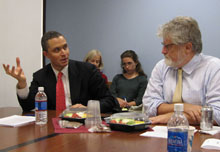
November 17, 2009 — At the Shorenstein Center brown-bag lunch, Harold Ford Jr., chairman of the Democratic Leadership Council and former member of the U.S. House of Representatives (D-TN), gave an overview of a politician’s perspective of the media.
Addressing the question of new media competing with traditional news organizations, Ford said that the advantage of new media is that “more perspectives are able to be heard,” but that it “doesn’t always guarantee that what you’re hearing is factually based.”
Ford suggested that a “lack of adherence” to “certain standards, certain thresholds” in traditional news media could contribute to “politicians being held to different standards.” However, he said that there is a “thematic consistency to all of our national [political] races,” and ideological arguments over big versus small government have deep historical roots and are not necessarily the result of technological changes.
A paradox of American politics, Ford observed, lies in complaints about Washington being too partisan, coupled with high ratings for evening cable news shows: “People don’t like opinion, unless it’s theirs.”
What poses a greater threat to democracy today, Ford asserted, is the “pay barrier” in campaign financing. Large private contributions and the expensive ads they can buy need a “system of checks and balances” so that misinformation can be countered fairly. Without contribution limits, there is an “ominous threat to how information is developed and disseminated.” Worse, the need for politicians to raise money during campaign seasons makes it difficult for them to work on legislation they care most deeply about, Ford said.
This article was written by Janell Sims and the photo taken by Leighton Walter Kille, both of the Shorenstein Center.

